Accounts connected to Masaf Institute launch hashtag campaign embracing conspiracies around 1967 attack on US Navy ship

By Hans Hanley and Alyssa Kann
As Alex Jones’ InfoWars and other fringe sites spread conspiracy theories about a military accident that occurred in 1967, a prominent network of Iranian Twitter accounts exploited these same conspiracies to promote antisemitic and anti-Israel sentiment in the United States.
On June 8, 2021, two different narratives surrounding the USS Liberty incident were promoted across the Internet. One, which has been circulating for decades, claims that the USS Liberty incident was a false-flag event meant to drag the United States into the Six Day War. On June 8, this theory was promoted anew by various conspiracy-oriented news sites, blogs, and 4chan boards. Similarly on June 8, an Iran-based Twitter campaign initiated the by the Masaf Institute run by conspiracy theorist Ali Akbar Raefipour, exploited these conspiracies.
Buoyed by the sea of misinformation promoted by Jones, 4chan, and BitChute, over 2,000 Iranian accounts furiously pushed antisemitic and anti-Israel narratives by utilizing the USS Liberty incident as a pretext. Thus, as various US-based news sites and blogs sought to use the incident’s anniversary to bolster claims about the malice of the deep state, Iranian actors sought to use these conspiracies to inflame animosities between the United States and Israel.
Decades of conspiracy theories
On June 8, 1967, during the Six Day War, an Israeli Air Force jet fighter and Israeli Navy torpedo boat attacked the US Navy ship USS Liberty, killing 34 and wounding 171. Israel apologized for the attack, reporting that its military had mistaken the American ship for an Egyptian vessel. More than 50 years later, controversy still surrounds this incident. The USS Liberty Veterans Associations still claims that the US government never properly investigated the incident. Various news organizations, including The Washington Post, The Intercept, and Haaretz, have published pieces outlining the lack of certainty surrounding the event.
This lack of clarity, however, has caused several conspiracy theories to propagate and persist over the past several decades. YouTube videos, articles, and blog posts promoting anti-Israel sentiment and US complicity have appeared over the course of several decades. This began when the USS Liberty Veterans Associations formed on the 25th anniversary of the USS Liberty incident on June 8, 1982. Since its creation, the association has called for a full investigation into the accident.
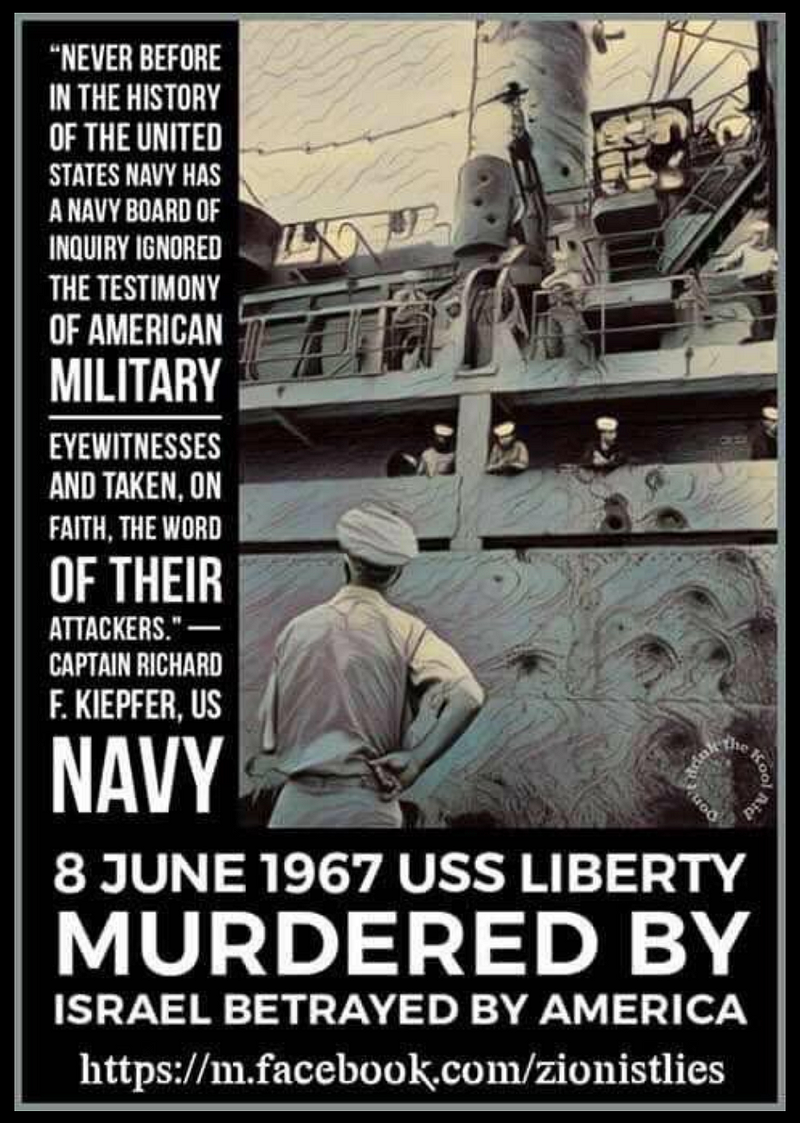
In 2006, Alex Jones, a prominent US conspiracy theorist and founder of popular conspiracy vector InfoWars, released several videos arguing that the USS Liberty was one of several false flag events. These false flags he argued were meant to give the United States an excuse to delve further into war. Later, as reported by the Anti-Defamation League (ADL), in 2016, Alison Weir, director of If Americans Knew, bought a series of billboards that read “Help the USS Liberty Survivors Attacked by Israel.” ADL has previously described If Americans Knew as “an organization that produces and disseminates propaganda intended to de-legitimize US support for Israel.” Various boards on 4chan have further intermittently discussed the incident as evidence of the deep state and to promote animus toward Israel and the Jewish people.

June 8, 2021: A new push on banned.video
On the 54th anniversary of the attack, the conspiracy website InfoWars released a video hosted on Jones’ banned.video platform, ostensibly interviewing one of the survivors of the attack. Not unlike many of Jones’ other diatribes, the video argues that the USS Liberty attack was a false-flag event in which then-US President Lyndon Johnson was complicit. While anti-Israel in nature, the video appears to be more squarely aimed at exposing the supposed “deep state” in the United States. Since it was first published, the video had garnered approximately 157,000 views as of July 26, 2021.
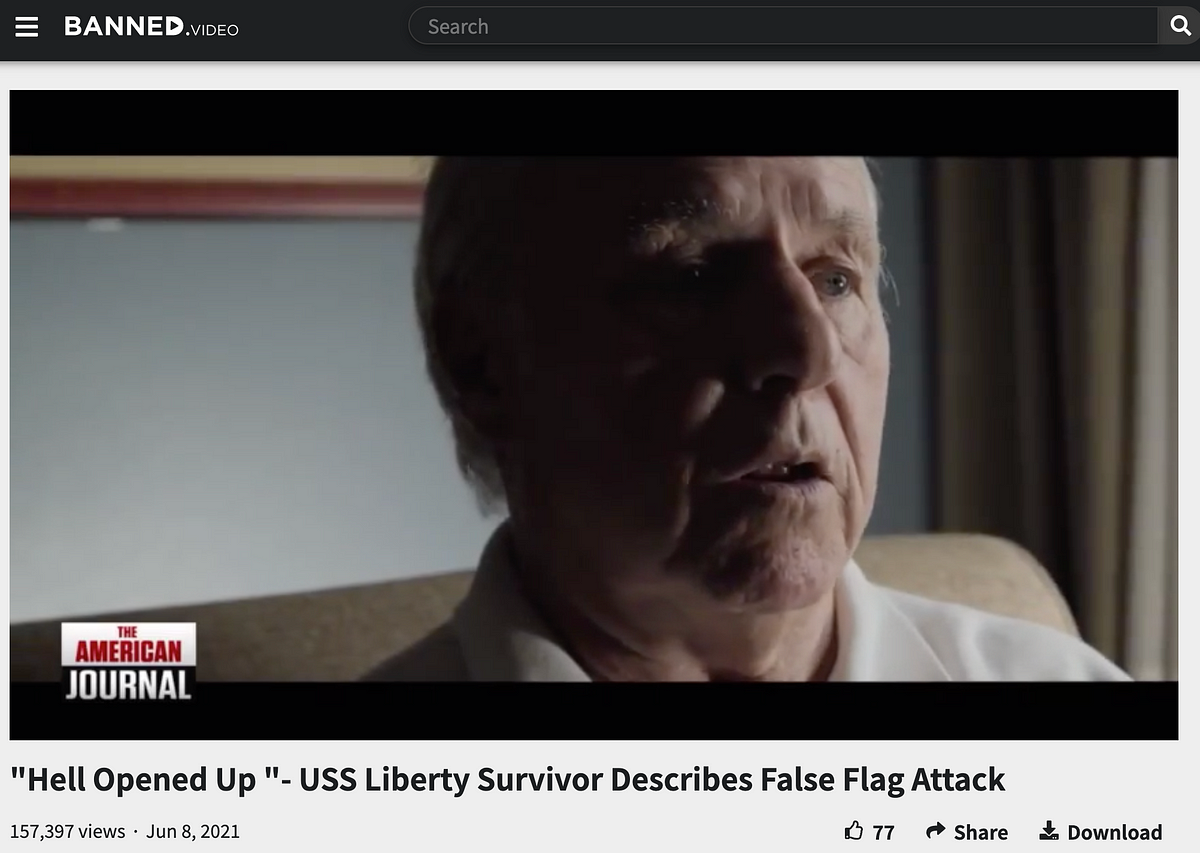
Besides Infowars, the DFRLab found that the video was promoted on a host of different conspiracy oriented sites and personal blogs, including bitchute.com, newsbreak.com, phibetaioata.com, robertdavidsteele.com. Known antisemite and conspiracy theorist Nick Fuentes further promoted the video on Telegram as well. In total, at least 24 different blogs and sites shared the video. According to a search using Facebook-owned monitoring tool CrowdTangle, it was shared over 7,300 times on Facebook.
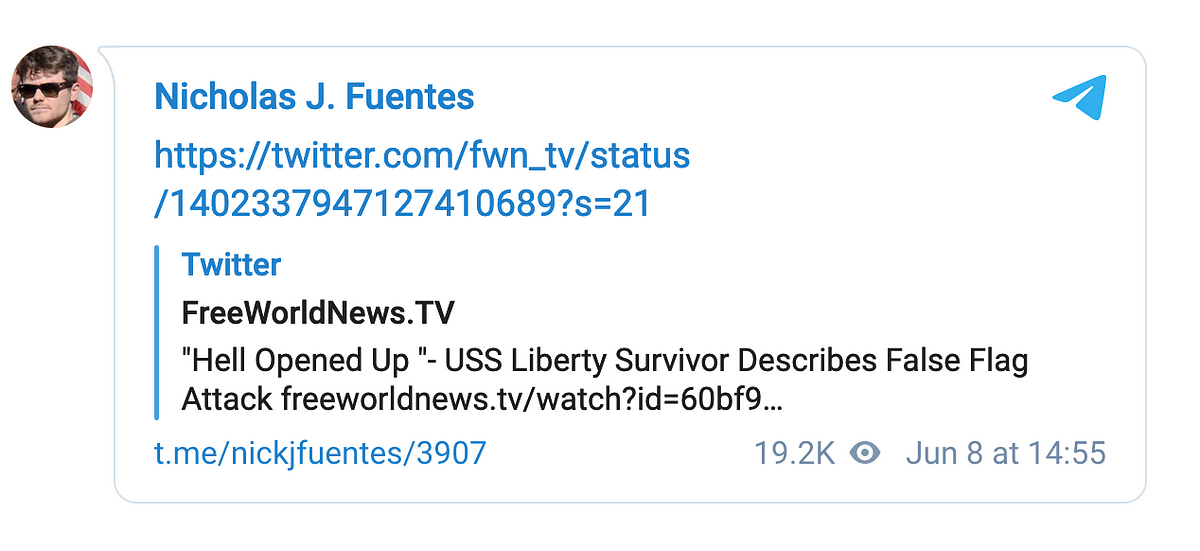
Exploited by Iran
While the conspiracy ecosystem in the United States has pushed the claim that the USS Liberty incident was a false flag and malign the US government, several online Iranian accounts piggybacked on these conspiracies to squarely promote an anti-Israel narrative. This activity seems to have its origins in 2019 when The Masaf Institute, which was founded by Iranian conspiracy theorist Ali Akbar Raefipour, produced a documentary outlining the incident as an act of Israeli aggression and US complicity.
Raefipour describes himself as a university lecturer and a researcher in “apocalyptic topics and cults.” Accounts under his name orchestrated the #COVID1948 campaigns in May of 2020 and 2021, as documented by the Stanford Internet Observatory and the DFRLab. @A_raefipur, the same Twitter account that appears to have pushed the #COVID1948 hashtag earlier in May 2021, also seems to have initiated a new #USSLiberty campaign. This campaign garnered over 2.37 million impressions on Twitter and the hashtag #USSLiberty was tweeted over 103,000 times overall throughout June.
As with the #COVID1948 hashtag, the campaign appears to have employed a large number of Iran-based accounts to spread the #USSLiberty hashtag. It was also coordinated through the Masaf Institute’s Telegram account. In a post, the Telegram account specified the hashtag and the time for it to be used on Twitter, calling it “Operation hashtag: #USSLiberty.” Specifically, the Masaf Institute rallied their followers to start tweeting the hashtag on June 8 at 8:00 p.m.
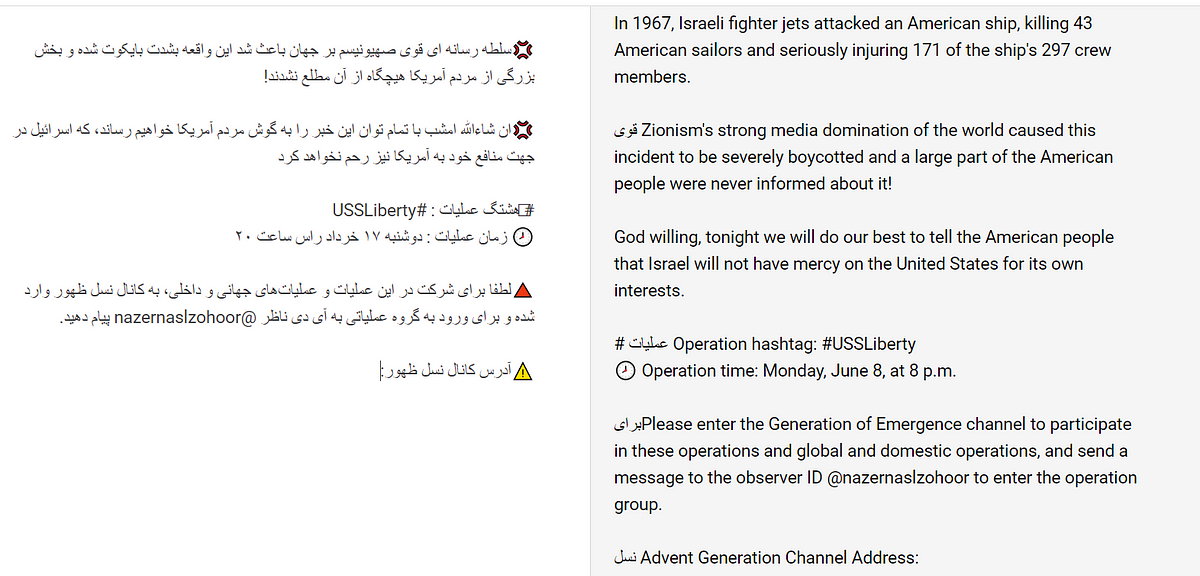
Since the appointed time of the campaign launch, 2,150 Iranian accounts have tweeted the hashtag nearly 27,000 times.
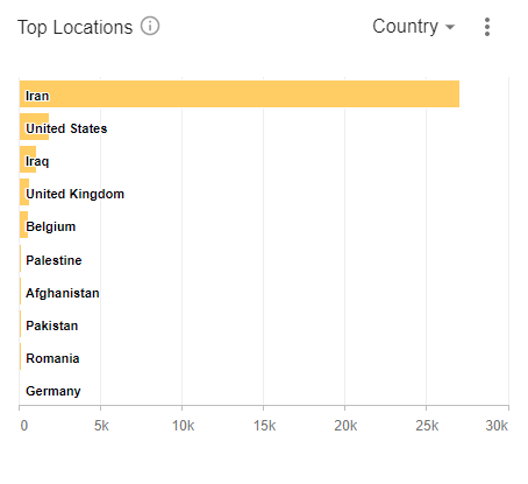
The hashtag quickly spiked over the first 24 hours before tapering off. Further, the @A_raefipur account appeared to have the largest influence later in this campaign, well after his account initiated it. Both of the top tweets in the campaign are his own, with 3,000 retweets a piece.

A key aspect of the #USSLiberty campaign appears to have been the targeting of people in the United States. Specifically, the campaign utilized similar language to that of USS Liberty false-flag conspiracy theorists. For example, similar to the name of the Anti-Israel organization “If Americans Knew,” @A_raefipur’s campaign utilized the phrase “Every American must know.”
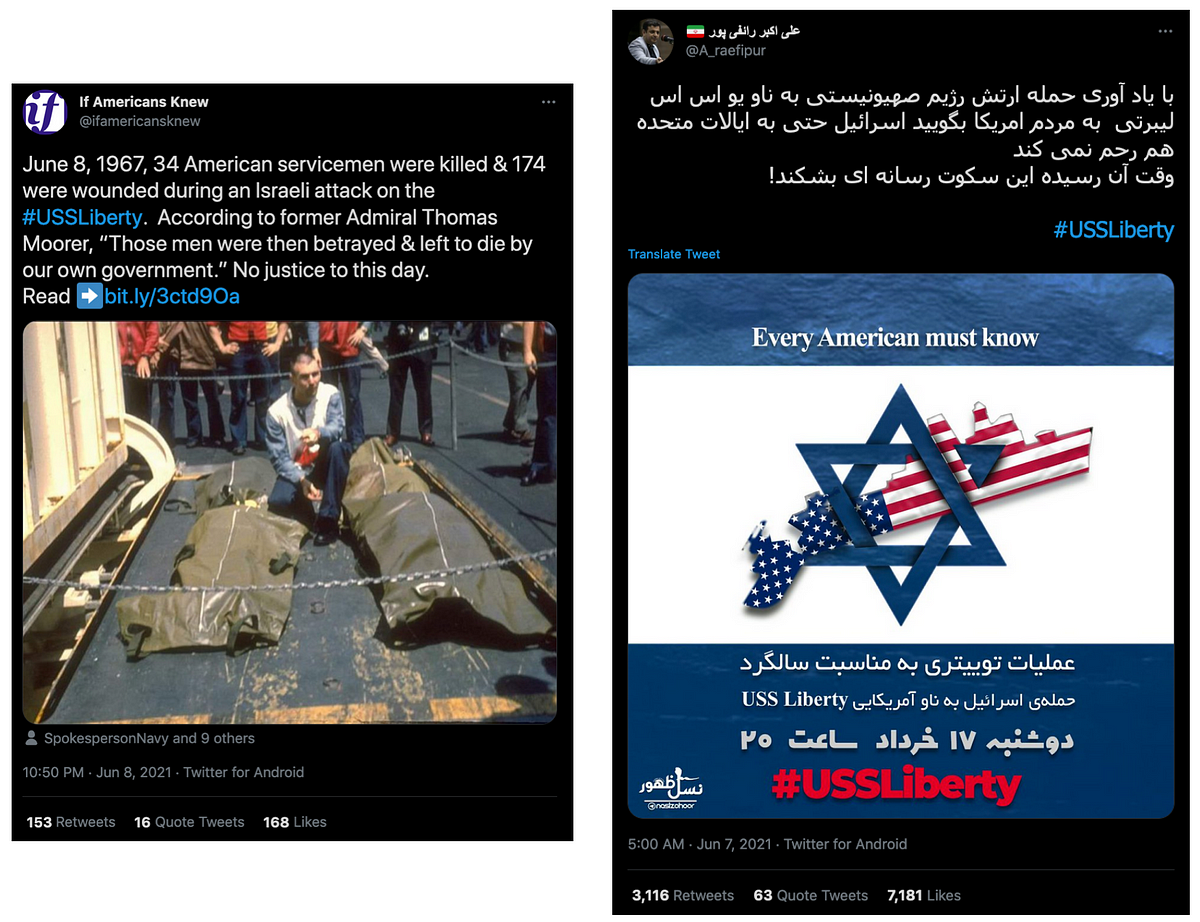
Furthermore, one of the most prominent memes tweeted by @A_raefipur linked to a conspiracy-oriented book published by one of the survivors of the USS Liberty attack. The campaign thus appears to have taken advantage of the vast amount of material provided by US-based conspiracy theories.
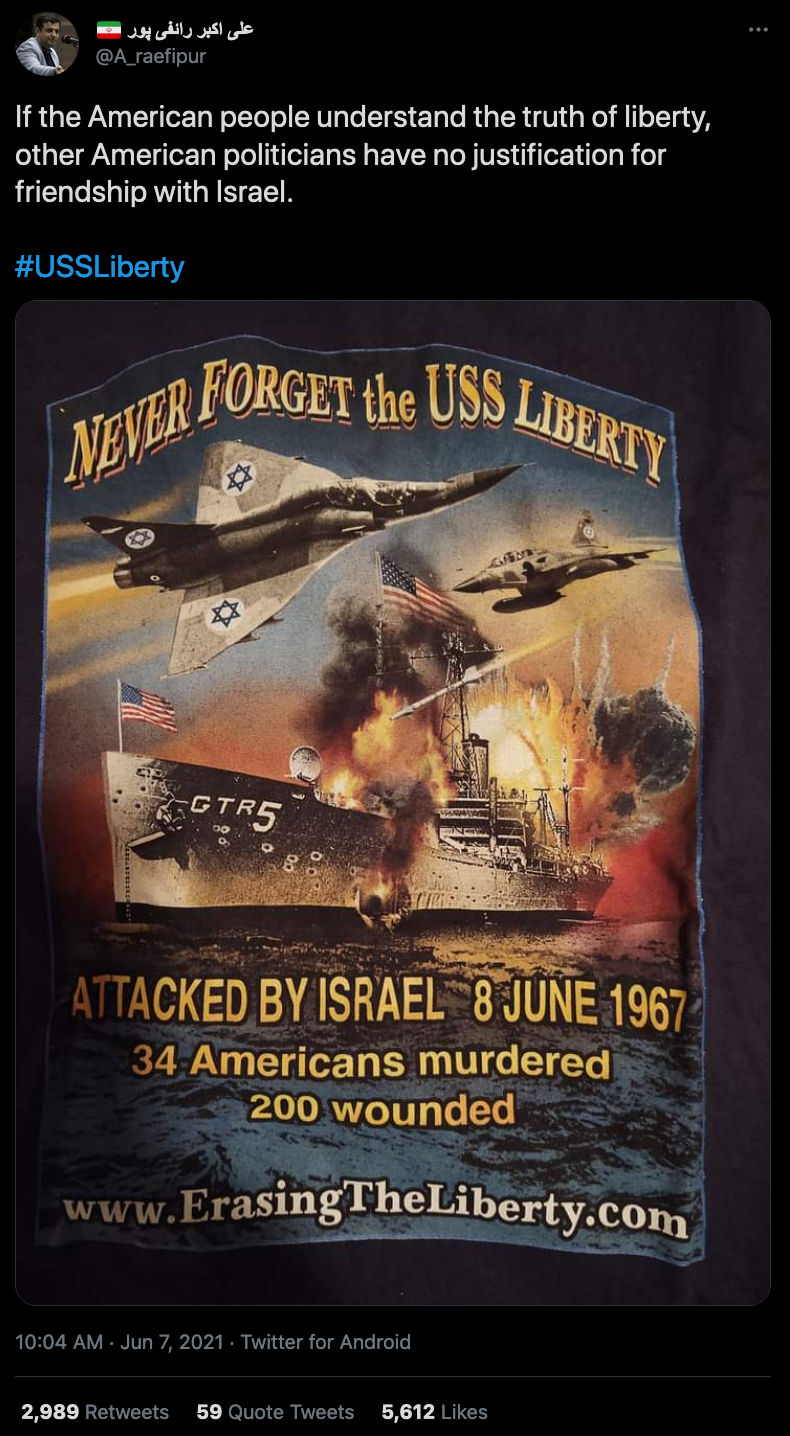
Raefipour and the Masaf Institute
Raefipour and his institute have cultivated a large following online across dozens of accounts. The DFRLab found seven still-active Twitter accounts listed under Raefipour’s name, two Instagram accounts, and one Telegram account. After translating from Farsi using Google Translate, the purpose of several of the low-activity Twitter and Instagram accounts appears to be as backups for when his high-activity accounts get banned.


Of note, the @raefipur1 Twitter account only followed two other Twitter accounts: @A_raefipur and @Masaf_fa, the main accounts for Raefipur and the Masaf Institute, respectively.

In addition to these personal accounts, the DFRLab found a host of different accounts devoted to promoting the Masaf Institute, including 20 different Twitter accounts, seven Instagram accounts, four YouTube channels, five Telegram channels, and five additional websites. Collectively, these accounts and websites have well over 1 million subscribers or followers. Several of these accounts appear to have also participated in the #USSLiberty campaign.
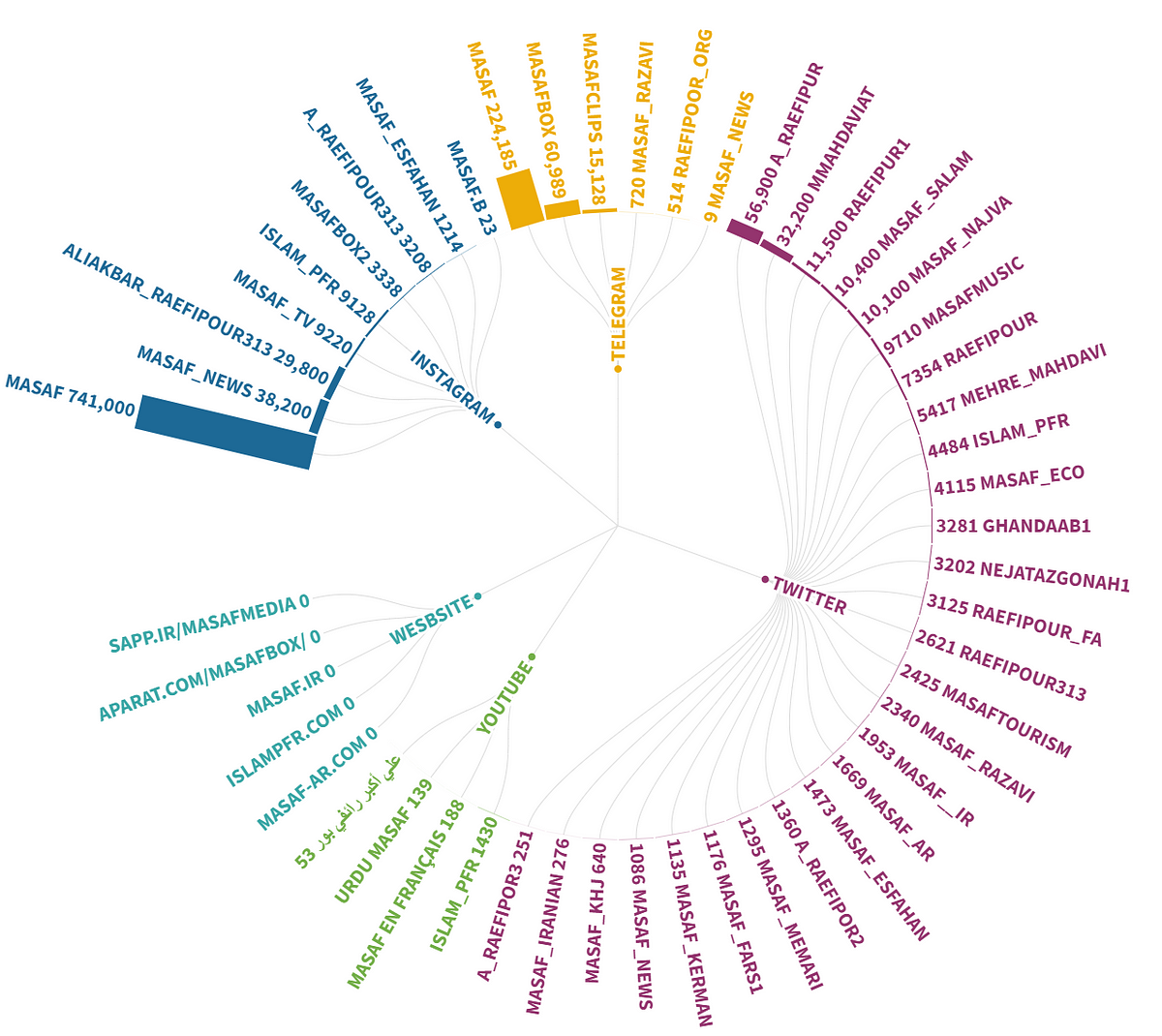

The USS Liberty tragedy resulted in 34 dead and 173 wounded. In recent decades, however, conspiracy theories surrounding the event have blossomed. These conspiracies, many antisemitic in nature, have now enabled foreign actors to seize on them, take advantage, and promote anti-Israel political narratives. Ali Akbar Raefipour is a notable example; through his Masaf Institute in particular, he has utilized these US-based conspiracy theories to organize and coordinate the #USSLiberty campaign on Twitter. By evading bans using several dozen accounts, he has managed to spread not just the #USSLiberty hashtag but also the #COVID1948 hashtag over the last two years.
Hans Hanley is a research intern with the Digital Forensic Research Lab.
Alyssa Kann is a Research Assistant with the Digital Forensic Research Lab.
Cite this case study:
Hans Hanley and Alyssa Kann, “Iranian social media exploit US-based conspiracies regarding USS Liberty incident,” Digital Forensic Research Lab (DFRLab), July 26, 2021, https://medium.com/dfrlab/iranian-social-media-exploit-us-based-conspiracies-regarding-uss-liberty-incident-95bc8960dcfa.
Follow along for more in-depth analysis from our #DigitalSherlocks.

